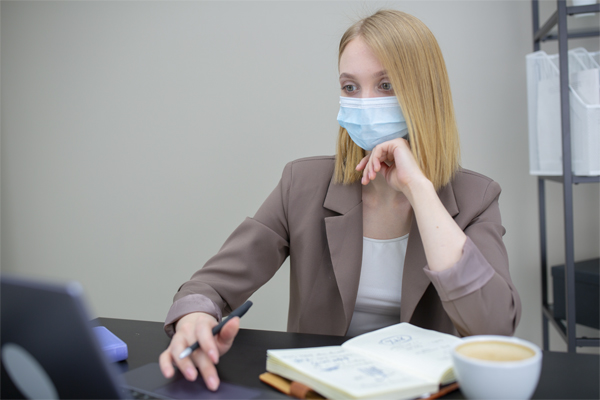The TUC has urged the Government to crack down on ‘bad bosses’ who break workplace safety rules, as England’s non-essential businesses prepare to reopen next week from 12 April.
The trade union body has warned the UK Government and employers that “infections could rebound” if workplaces aren’t Covid-secure. It also highlighted that not a single employer has been fined and prosecuted for putting their staff in danger, despite thousands of workplace outbreaks. Additionally, the Health and Safety Executive (HSE) has still not amended its much-criticised designation of coronavirus as a “significant” rather than a “serious” workplace risk, which limits the enforcement options open to inspectors, noted the TUC.
The union body wants the Government to take a much tougher stance with companies who flout health and safety rules; and provide the HSE with a long-term funding boost. “We all want this lockdown to be the last. But if we get workplace safety wrong, the virus could rebound,” pointed out TUC General Secretary Frances O’Grady. “Ministers must send out a strong message to employers: act now on workplace safety.”
The Government “has imposed big fines on individuals who break lockdown rules. But not a single employer has been prosecuted and fined for putting workers or the public at risk. It’s time for the Health and Safety Executive to crack down on bad bosses”, remarked O’Grady. “Over a year into the pandemic, it beggars belief that ministers have not fixed sick pay. Sick pay is too little to live on. No wonder too many are not self-isolating when they need to. Ministers have the power to make self-isolation effective overnight; and cut transmission immediately. All they need to do is raise statutory sick pay to the level of the real Living Wage; and make sure everyone can get it.”

SKIMPING ON SAFETY MEASURES
“Before reopening, every employer must run a new risk assessment, prioritising good ventilation; and act to make sure their workplace is Covid-secure,” added O’Grady. “They have to consult their workers and unions on their safety plans. And they have to publish their risk assessment to reassure their workers and customers. Even as some workplaces reopen, employers must still make sure that everyone who can work from home continues to do so. More people are getting vaccinated every day; but that does not mean that employers can skimp on safety measures at work.”
The union body said the vaccine rollout and workplace testing must not be used as an excuse to relax safe working rules; and offers new guidance for a “safe and responsible” return. Over 11,000 working age people have died during the pandemic, with thousands of outbreaks in workplaces. Its latest report sets out the steps ministers and employers should take to keep people safe at work; and to prevent another spike in workplace infections. As well as cracking down on bosses who risk workers’ safety, the TUC wants the Government and employers to ensure workplaces are Covid-secure; decent sick pay is offered to all staff; as well as more support for workers to get vaccinated.

MAKING WORKPLACES COVID SECURE
The TUC wants all employers to update their risk assessments to take account of what is now known about the importance of ventilation. As the UK unlocked in summer 2020, more emphasis was placed on surface disinfection. But the guidance has since changed to make effective ventilation the priority. Any activity which can be conducted outside should be; and employers should invest in ventilation systems, as well as continuing to enforce social distancing and the wearing of face coverings, confirmed the union body.
A TUC survey of more than 2,000 union safety representatives published last week, revealed that one in four reps are unaware of a risk assessment taking place in their workplace in the last two years. This is despite it being a legal requirement for employers to have an up-to-date risk assessment and to consult safety reps and involve staff in writing it. In addition, the TUC noted that the guidance on working from home has not changed. Everyone who can work from home should continue to do so until at least 21 June. Employers should assess the ability to work from home at the level of individual jobs; and should not require workers to travel to desk-based jobs, even in sectors that are allowed to be open.

DECENT SICK PAY FOR ALL
Decent sick pay remains critical to ensuring a safe return to work, added the TUC. The union body said it “beggars belief” that a year into the crisis ministers still haven’t fixed the problem of workers not being able to afford to self-isolate. That’s despite repeated warnings from the TUC and the Government’s own head of Test and Trace, Dido Harding.
A new TUC poll of private sector employers reveals that of those who intend to use workplace testing, only 28% pay statutory sick pay; which is £96.35 per week – and too low to live on and will cause hardship, confirmed the union. Only 47% of those employers who propose to use workplace testing provide full company sick pay. The TUC wants ministers to increase statutory sick pay to at least the rate of the real living wage; and extend eligibility to the two million low-paid workers who currently don’t qualify for it.

SUPPORTING STAFF TO GET VACCINATED
Employers must step up and help the national health effort by giving their staff paid time off to get vaccinated. But recent research reveals that less than half of UK employers (45%) actually give their staff paid time off to get the jab, confirmed the TUC.
The union body said companies should persuade staff to get the vaccine, but not make it a condition of employment. Making vaccinations compulsory will damage employer-staff relations; and could result in legal cases on the grounds of discrimination, the TUC pointed out.
There are still questions to be answered about Covid status passports, including how testing data will be collected, and how any scheme will maintain the confidentiality of workers’ personal health information. Any Covid status passport scheme must require employers to consult with recognised unions at the sectoral and workplace level, concluded the TUC; and “will only work where employers provide decent sick pay”.







































